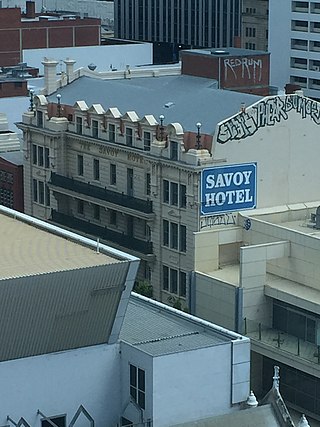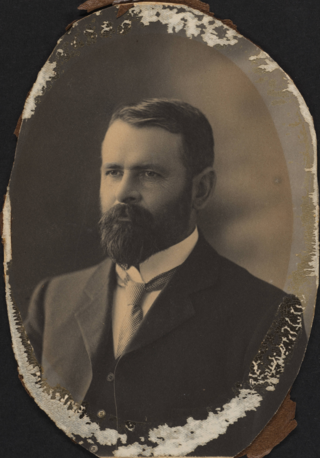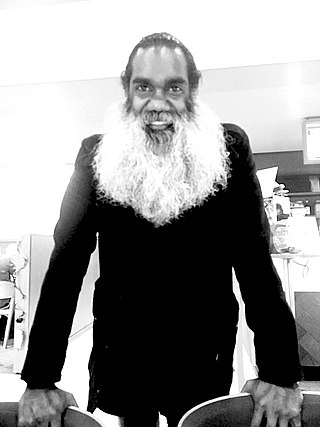
Subiaco is an inner-western suburb of Perth, the capital of Western Australia. It is approximately 3 km (1.9 mi) west of Perth's central business district, in the City of Subiaco local government area. Historically a working-class suburb containing a mixture of industrial and commercial land uses, since the 1990s the area has been one of Australia's most celebrated urban redevelopment projects. It remains a predominantly low-rise, urban village neighbourhood centred around Subiaco train station and Rokeby Road.
Subiaco Oval was a sports stadium in Perth, Western Australia, located in the suburb of Subiaco. It was opened in 1908 and closed in 2017 after the completion of the new Perth Stadium in Burswood.

Dorothy Coade Hewett was an Australian playwright, poet and author. She wrote in a number of different literary styles: modernism, socialist realism, expressionism and avant garde. She was a member of the Australian Communist Party in the 1950s and 1960s, which informed her work during that period.

Crown Perth is a resort and casino located in Burswood, Western Australia, near the Swan River. The resort consists of a casino, a convention centre with meeting rooms, theatre and two ballrooms along with 32 restaurants and bars, a nightclub and recreational facilities. It also features three hotels: the 405-room Crown Metropol Perth, the 291-room Crown Promenade Perth and the 500-room luxury hotel Crown Towers Perth, which was opened in December 2016. The Crown Perth is one of several Crown Resorts located in capital cities across the country.

Perth Modern School is a public co-educational academically selective high school, located in Subiaco, an inner city suburb of Perth, Western Australia. Perth Modern is Western Australia's only fully academically selective public school. Established in 1911, the school is both the oldest public high school and the oldest co-educational high school in Western Australia (WA).

His Majesty's Theatre is an Edwardian Baroque theatre in Perth, Western Australia. Constructed from 1902 to 1904 during a period of great growth for the town, the theatre is located on the corner of Hay Street and King Street in Perth's central business district.

Perth Festival, named Perth International Arts Festival (PIAF) between 2000 and 2017, and sometimes referred to as the Festival of Perth, is Australia's longest-running cultural festival, held annually in Western Australia. The program features contemporary and classical music, dance, theatre, performance, literature and ideas, visual arts, large-scale public works. The main events of the festival take place every year, from February to March and the film program now known as Lotterywest Films runs from November to April, as part of the Perth Festival.

The Playhouse Theatre was a theatre in central Perth, Western Australia. It was purpose-built for live theatre in 1956 and remained one of the city's principal venues for performing arts for over half a century until replaced by the State Theatre Centre of Western Australia in January 2011. It was home to the National Theatre Company from its establishment until 1984, and then to its successor, the Western Australian Theatre Company, until its disbandment in 1990.

Theatre of Australia refers to the history of the live performing arts in Australia: performed, written or produced by Australians.

Hay Street is a major road through the central business district of Perth, Western Australia and adjacent suburbs. The street was named after Robert William Hay, the Permanent Under Secretary for Colonies. Sections of the road were called Howick Street and Twiss Street until 1897. One block in the central business section is now a pedestrian mall with extremely limited vehicular traffic, so that it is necessary to make a significant detour in order to drive the entire length of Hay Street.

The City of Subiaco is a local government area in Western Australia. It covers an area of approximately 7 km² in inner western metropolitan Perth and lies about 3 km west of the Perth CBD. The City includes the historically working-class suburb of Subiaco centred around Rokeby Road. Since the 1990s the area has been extensively redeveloped and gentrified.

Lincoln Street Ventilation Stack is located at 57 Lincoln Street, at its intersection with Smith Street, Highgate, Western Australia.
UWA Publishing, formerly known as the Text Books Board and then University of Western Australia Press, is a Western Australian publisher established in 1935 by the University of Western Australia. It produces a range of non-fiction and fiction titles.

The Astor Theatre is located at 659 Beaufort Street, Mount Lawley, Western Australia. It comprises a single, two and three-storey masonry inter-war Art Deco style theatre and retail building.
William Garnsworthy Bennett was a Western Australian architect, well known for his Art Deco and Inter-War Functionalist style of civic, commercial and domestic buildings, including the Lord Forrest Olympic Pool in Kalgoorlie, the Beverley Town Hall, the Raffles Hotel and Plaza Theatre and Arcade in Perth.

William Burden Hardwick, often referred to professionally as W.B. Hardwick, was an Australian architect who from 1917 until 1927 was Principal Architect of the Public Works Department in Western Australia. The Encyclopedia of Australian Architecture refers to Hardwick as being "well known for continuing the high standards of design in public buildings established during the gold boom, particularly in hospitals, schools and post offices throughout the state".

The Savoy Hotel is a heritage-listed former hotel in Hay Street, Perth, Western Australia. It was built in the 1910s and closed in 1991. It is listed on the State Register of Historic Places, has been classified by the National Trust of Australia, and was listed on the former Register of the National Estate.
Graham Walne is a prolific British-born theatre consultant, lighting designer, author, and lecturer who has worked in Europe, the US and Australia, where he has lived since 1998.

Michael Francis Cavanagh was an Australian architect, primarily known for his work in Western Australia from 1895 to the late 1930s.

Trevor Jamieson is an Aboriginal Australian stage and film actor, playwright, dancer, singer and didgeridoo player.

















